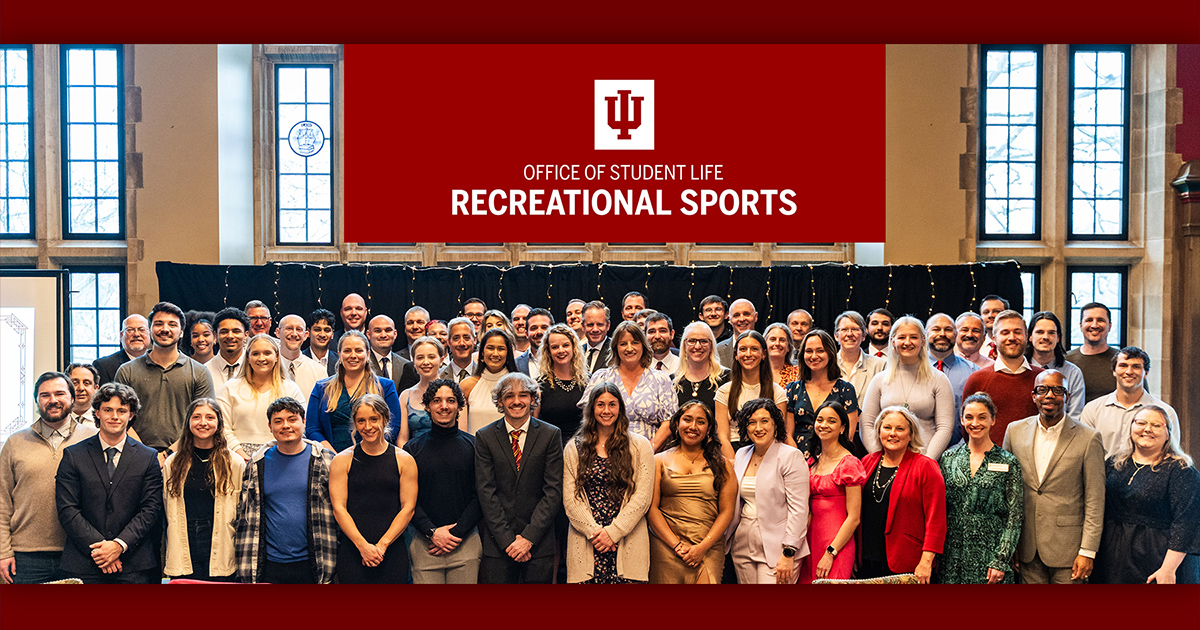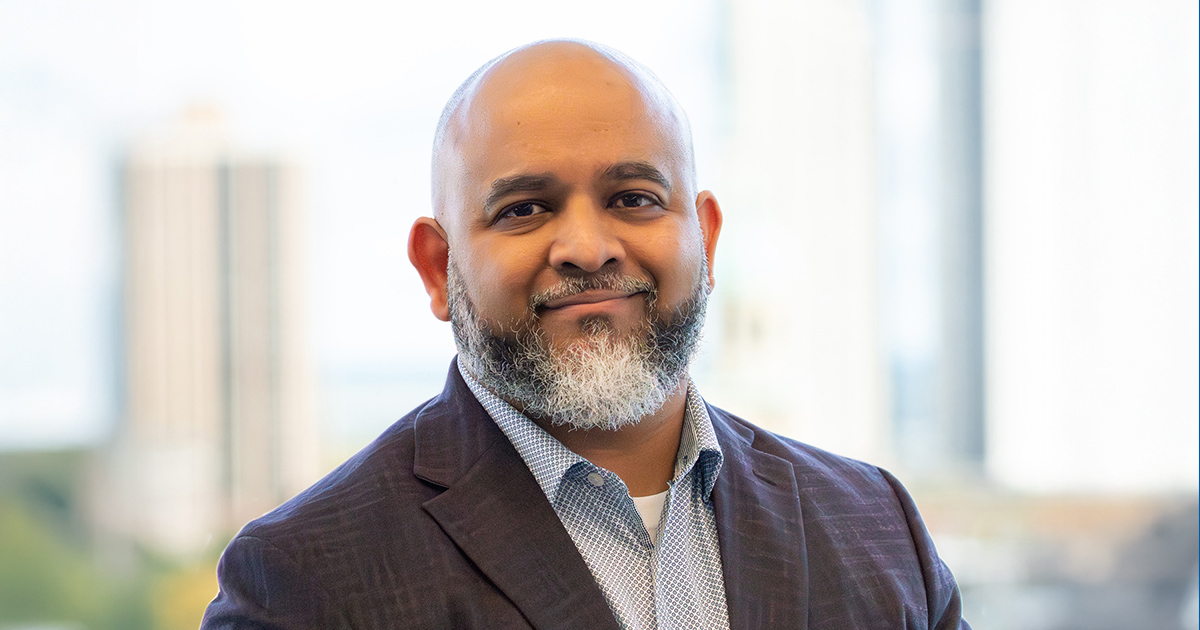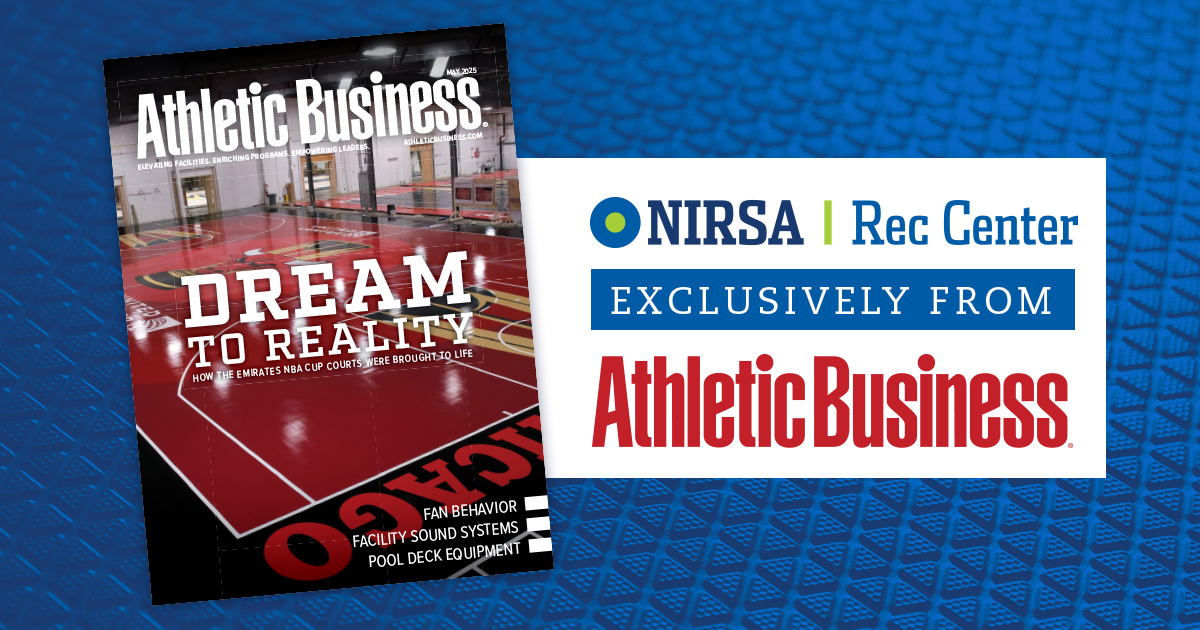Indiana University Recreational Sports realizes that the concepts of wellness and wellbeing on campus are emerging as important strategic initiatives in higher education.
With questions swirling around about how wellbeing shows up in campus recreation, how recreation impacts campus wellbeing, and what wellbeing actually means, the leadership at IU RecSports decided to enroll their entire team of approximately 50 professional staff in NIRSA’s Recreation for Wellbeing: Elevating Our Impact course.
“We felt like it was not just symbolic, but functionally important that all of our full-time folks go through that training because this is the language we’re going to speak going forward,” says Chris Arvin, Executive Director of IU Recreational Sports. “I think it’s important that we put IU on the map as a place that really cares about health and wellbeing for students and the campus community as a whole.”
Indiana University is one of the only universities in the country to send their entire professional staff through the course.
“As we think about campus recreation being an entry point for students’ wellbeing journey, this course is helping our team understand and articulate why we are an important piece of the overall campus strategy,” says Josh Downing, Associate Director of Programs at IU Recreational Sports.
Indiana University’s overall campus strategy shows that IU RecSports staff enrolled in NIRSA’s multiweek course at the perfect time—the Office of Student Life at Indiana University Bloomington recently formalized coordinated health and wellbeing efforts that align with the IUB 2030 strategic plan.
“With the significant investment in student wellness within the IUB 2030 strategic plan, Recreational Sports can maximize our ability to be a major entry point for students to focus on wellbeing,” says Hannah Armstrong, Associate Director of Operations at IU Recreational Sports. “Gen Z students want and expect more and different offerings than RecSports has offered in the past. We are primed to address an array of wellness needs in our physical spaces while also boosting a student sense of belonging and promoting student utilization of additional wellbeing resources across campus,” she adds.
The third goal of the Student Success and Opportunity section of the IUB 2030 plan—appropriately titled Inclusion, Wellness, and Student Support—states: “IUB will foster a diverse and inclusive student community that stimulates a strong sense of belonging and well-being.”
“By creating a standardized baseline of knowledge, this course supports our team’s ability to define wellbeing as an organization and have a uniform understanding and approach to supporting IU’s health and wellbeing efforts,” says Lauren Colbert, Digital Media and Outreach Coordinator for IU Recreational Sports.
The course description for Recreation for Wellbeing: Elevating Our Impact makes the claim that “we’re always stronger when we move forward together.” The team at IU Recreational Sports takes that sentiment to heart—not only in the context of the IUB 2030 plan, but also in the context of on-campus commitments and opportunities.
“This online course from NIRSA has reinforced the idea that there is no one program or solution to wellbeing; it takes a variety of programs, professionals, and students to put the picture of wellbeing together for each student and each campus,” says Katie Landrum, Assistant Director of Group Exercise at IU Recreational Sports. “For IU Recreational Sports, this course has given our team confidence in our seat at the table in campus wellness efforts.”
Katie also noted that the course allows IU Recreational Sports to become part of the conversation on campus by taking an active role in supporting student health and wellbeing efforts that are happening both internally and externally. Collaborative campus events like Celebrate EveryBODY Week are a prime example of how RecSports can continue using its network to share their message with students all across campus. This week-long celebration took place from February 25 to March 2 this year and focused on self-acceptance, fostering positive body image, and highlighting the beauty, strength, and grace each and every body has.
In terms of her day-to-day job as the Assistant Director of Group Exercise, Katie is looking forward to continuing her pursuit of new ways to bring group exercise to the campus community.
“We have a breadth of opportunities, spaces, and students on campus that we can connect with and support, so it’s exciting to know that these opportunities work towards our overall wellbeing efforts for students and not just seen as supporting their physical health,” she says. “Taking our program out onto campus and collaborating with our colleagues can build community, confidence, and self-efficacy for our students and empower them to be a driving force in their own wellbeing and the overall campus wellbeing.”
Multiple members of the IU Recreational Sports team, including Lauren, learned not only important skills from the course material, but also from colleagues across North America as well.
“I enjoyed connecting with other campus recreation professionals across the country who had shared experiences, challenges, and successes while programming for wellbeing,” says Lauren. “Hearing how other schools have approached these efforts through campus partnerships, events, and key programs opens up a world of ideas for me as an emerging professional. It was especially motivating when the learning cohort discussed changes they have been able to make on an individual level within their locus of control,” she adds.
On the facility side of things at IU Recreational Sports, Mike Grannan, the Service Director of Risk Management and Facility Projects, reflected on the experience by saying that wellness is not only an idea for him, but also a concrete goal.
“Wellness to me, as a behind-the-scenes player, is the satisfying feeling created in setting the stage for my programming colleagues so they can do their work and help others to achieve wellness and find community and belonging,” says Mike.
“We are eager to review the individual action plans that we have been working on as part of the course,” Chris says. “We will dedicate time this summer to reviewing, evaluating, and prioritizing these plans to help shape annual goals, priorities, and long-term planning for our unit.”
Chris also mentioned how NIRSA’s course has been a great influence on the future of IU RecSports. “It has been great to connect with so many colleagues across the country during this course. Folks are doing some amazing things at their respective institutions, and it is so encouraging to see NIRSA making such a great resource available for us,” says Chris. “It has also been fun to see one of our IU RecSports alumni helping to lead this course for NIRSA!”
- To learn more about recreation and wellbeing at Indiana University – Bloomington, reach out to one of the many NIRSA members working on the IU campus.
Sydney Randall is currently a Communications Specialist, Student Life Marketing at Indiana University Bloomington; you can email her at sydranda@iu.edu.







